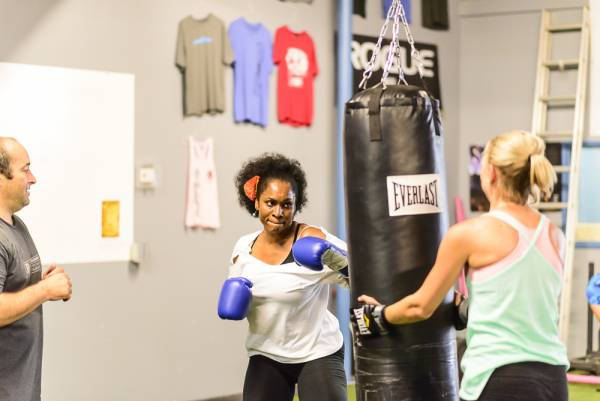Whether you’re just starting out on your fitness journey or you’ve been in the game for years, you’ve probably made some mistakes. When I first started out, I screwed up a lot. And, I still do – but now I’m aware of my mistakes.
There’s a ton of information out there, and it’s easy to get lost in all the rules, tips, and advice. When it comes to shedding fat, the information overload can lead us into hoping we are doing the right thing. But the truth is, you might be doing more harm than good.
There are the common pitfalls like under-eating, doing too much cardio, and avoiding fat all together. But there are other mistakes that often go overlooked. And though making mistakes is a great way to learn, it’s wiser to learn from someone else’s mistakes before you commit them on your own.
Here are four fat-loss mistakes I made in the past that will help make your journey as smooth as possible.
1. You’re Doing This All By Yourself
If shedding body fat was a walk in the park, don’t you think you’d have already done it on your own? It’s easy to rely on emotional motivation right out of the gate. But after a few weeks, it gets a lot more difficult – especially if you’re trying to do it all by yourself.
All professional athletes have coaches. They have coaches because they want to perform their best in their respective sport. For you, it may not be a sport that you want to perform your best at. But you do want the best results in terms of your body composition and health, right?
Unless you are willing to invest in the time and energy it takes to learn how to do this, having a coach is the best way to reach your goals. Trying to develop a diet plan for yourself when you’re a beginner to nutrition may not only frustrating, but may also negatively impact your results. You wouldn’t ask your accountant to replace your brakes, would you?
“Release the obsession to control the outcome by focusing on your behavior instead.“
Successful coaching isn’t all about giving perfect fitness and nutrition advice, but more about ensuring you don’t give up. If you’ve struggled with trying to do it all on your own, then it’s time to get accountable. Being accountable is far more important than being motivated, because you won’t always feel motivated. But if you have someone on your tail keeping you in check, then you’ll get to the gym and eat the right food. A coach makes you do the things you don’t want to do, in order for you to get the things you want.
2. Believing You Have to Be Superman Every Day
It’s common to hear the advice, “Give your 100%” effort every day.” While I don’t think it’s bad advice, I do think it can mislead you in two ways. First, you think you have to hit a homerun every day. Second, you think you have to be perfect. Expecting perfection just sets you up for failure.
You don’t have to hit a home run every day to make progress. Even in baseball, players don’t hit it out of the park each time they step to the plate. There are far more base hits that lead to points on the scoreboard than home runs.

That’s what your journey will look like, too. On a few days, you’ll smack one into the stands. You’ll show up and set a new personal record on your deadlift. But on most days, you’ll step up the plate and get a base hit. You’ll show up to the gym, do the work, and leave.
You also don’t have to be perfect to make progress. Ty Cobb had the greatest career batting average in history at .3664. That means out of every ten times at bat, he failed approximately six. But he’s known as one of the greatest hitters of all time.
Some days you’ll show up to the gym and miss that lift. But that doesn’t mean you didn’t give your all. It means you missed the lift, just like Ty Cobb took a swing and missed. Your 100% will look different from day to day. And it’s okay.
3. Obsessing Over the Outcome
This is arguably the most essential skill to your fitness success – knowing the difference between outcome goals and behavior goals. An outcome goal is the main outcome or objective you want to accomplish. “I want to lose twenty pounds in ten weeks” and “I want to increase my squat by forty pounds in twelve weeks” are outcome goals.
But you can’t directly control outcomes. They’re achieved when a series of behaviors are followed. Behavior goals are the steps you do in order to accomplish your outcome goal. When your goal is to lose twenty pounds in ten weeks, your behavior goals might include:
- I will hit the gym Monday, Tuesday, Friday, and Saturday at ten in the morning.
- I will reduce my intake by 300 calories for the next ten weeks.
“Being accountable is far more important than being motivated, because you won’t always feel motivated.“
While you have control of your behavior, you don’t have control over the outcome. Obsessing over the end result sucks the energy out of you. You’re far better off focusing on the daily behaviors that will lead you to the best outcome.
4. Assuming the Destination Is the Reward
When you set out to shed body fat, you typically imagine the reward as having a leaner physique, putting on more muscle, and arriving at your goal weight. But when you do arrive at your goal, there is an enemy crouching at the doorstep waiting to devour you: it’s called destination achievement.
There is probably nothing comparable to the feeling of an empty soul after achieving what you thought would provide fulfillment. It’s when you work hard to lose thirty pounds in order to win $1,000 bucks as the prize. It’s when you decide to win a competition at all costs, even if it means compromising your ethical beliefs.
Destination achievement is evident when genuine motivation-autonomy, mastery and purpose are stripped away from the process and outcome. When you’re motivated to achieve exclusively for an extrinsic reward, reaching your goal will lack personal fulfillment.

The journey to improve yourself – physically, mentally, and spiritually – isn’t a destination, but a lifelong process. There is no destination we can get to on this earth that will provide complete fulfillment. The true reward is the person you become along the way, not the six-pack abs or boulder shoulders.
Intrinsic motivation is the key to beating destination achievement. Rather than being fueled by rewards, it’s important that you find an approach to your fat-loss journey that you enjoy. The activity itself needs to be the reward, not the destination.
Enjoy the Process
Fat loss is a long, slow journey. It’s made even slower by making the errors we just went over. My hope is that you learn from the mistakes I made – before you have to experience them on your own.
Work with a coach who leaves room for autonomy, yet supports you where you need help. Give up the need to feel perfect. Release the obsession to control the outcome by focusing on your behavior instead. And lastly, make it a priority for your activity itself to be your reward, instead of fueling yourself with external motivation.
Do all this, and your goal will not only be a reality much sooner, but you’ll arrive with higher level of wellness.
Click Here to Discuss in Our Forums
Check out these related articles:
- The Fitness Existentialist – It Starts With You
- The Difference Between Love and Fear In Fitness
- Lessons In Fitness and Life From Bruce Lee
- What’s New On Pulse Beat Fit Today
Photos 1 and 3 courtesy of CrossFit Empirical.
Photo 2 courtesy of Shutterstock.






